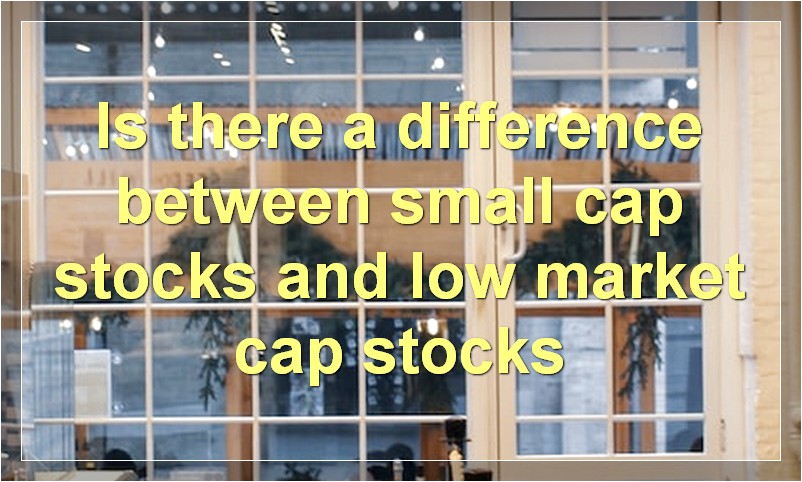Many investors are afraid to invest in low market cap stocks because they are considered to be more volatile. However, low market cap stocks may actually be a smart investment for several reasons. First, low market cap stocks tend to be undervalued by the market, which means that there is potential for higher returns. Second, since these stocks are not well known, they may be less affected by market cycles. Finally, low market cap stocks tend to be more nimble and able to adapt to changes in the market more quickly than their larger counterparts.
What is market cap and why is it important
What is market cap and why is it important?
Market cap, or market capitalization, is simply a measure of the overall value of a company’s shares. It’s calculated by multiplying the total number of a company’s shares by the current market price of each share. So, if Company XYZ has 1 million shares outstanding and each trades for $10, then its market cap would be $10 million.
Why is market cap important? Because it’s one way to determine how much a company is worth. A company with a higher market cap is generally considered more valuable than one with a lower market cap. That’s because, all else being equal, a company with a higher market cap should have a higher stock price and be able to generate more revenue and profit than a smaller company.
Of course, there are other ways to measure a company’s value, but market cap is one of the most commonly used metrics. That’s because it’s relatively easy to calculate and it provides a good snapshot of a company’s overall value.
So, if you’re considering investing in a particular company, it’s worth taking a look at its market cap to get an idea of its size and value.
What are the benefits of investing in companies with low market cap

When it comes to investing, there are a lot of different things that you can consider. One thing that you may want to look at is the market capitalization, or market cap, of a company. Companies with a lower market cap are usually less well-known than those with a higher market cap. However, there are some benefits to investing in companies with a low market cap.
One benefit is that these companies may be undervalued. Because they are not as well-known, they may be traded for less than they are actually worth. This means that you could get a good deal on your investment.
Another benefit of investing in companies with a low market cap is that there is more potential for growth. These companies are usually smaller and have more room to grow than larger companies. This means that your investment could grow more over time.
Of course, there are also some risks associated with investing in companies with a low market cap. These companies may be more volatile and less stable than larger companies. They may also be more likely to fail. However, if you do your research and invest carefully, you can minimize these risks.
Overall, there are both risks and rewards associated with investing in companies with a low market cap. If you are careful and do your research, you may be able to find some great opportunities.
What are some of the risks associated with investing in companies with low market cap
There are a few risks associated with investing in companies with low market cap. One such risk is that these companies may be more volatile and therefore more risky. Additionally, these companies may have less financial resources and be less capable of weathering economic downturns. As a result, investors in these companies may see their investments decline in value more rapidly during periods of economic turmoil. Finally, these companies may be less well known and have less of a track record than larger companies, making it more difficult to assess their financial stability and future prospects.
How can investors identify companies with low market cap
In order to identify companies with low market capitalization, investors should look at a company’s financial statements and compare its market cap to its competitors. Companies with low market capitalization are typically less risky and more volatile than their larger counterparts, but they also offer the potential for higher returns.
Why do some analysts believe that low market cap stocks are undervalued
Some analysts believe that low market cap stocks are undervalued because they may be overlooked by investors and not given the attention they deserve. Low market cap stocks may also be more volatile than their larger counterparts and offer greater upside potential. However, these stocks may also be more risky and less liquid, so investors need to do their research before investing.
Is there a difference between small cap stocks and low market cap stocks

When it comes to stocks, there are a lot of different terms that get thrown around. Two of those terms are small cap stocks and low market cap stocks. A lot of people use these terms interchangeably, but is there actually a difference between the two?
In short, yes. Small cap stocks are stocks with a market capitalization of $300 million or less. Low market cap stocks are stocks with a market capitalization of $50 million or less. So, while all small cap stocks are low market cap stocks, not all low market cap stocks are small cap stocks.
Why does this distinction matter? Well, for one thing, small cap stocks tend to be more volatile than their larger counterparts. They also tend to be more lightly traded, which can make it difficult to find buyers or sellers when you want to exit a position. And finally, they can be more subject to manipulation by insiders since there are fewer shares outstanding.
That said, small cap stocks can also offer investors a chance to score big gains. They tend to be more nimble and responsive to changes in the marketplace, which can mean they recover faster from downturns. They also often have more room to grow than larger companies.
So, if you’re thinking about investing in small cap or low market cap stocks, just be aware of the risks and rewards involved. These types of stocks can be a great way to boost your portfolio’s returns, but they come with a higher degree of risk.
What factors contribute to a company’s market cap
A company’s market cap is determined by a number of factors, including its size, profitability, and growth potential.
Size is perhaps the most important factor, as it determines how much of the market a company controls. The more of the market a company has, the higher its market cap will be.
Profitability is also a key factor, as investors are looking for companies that are making money. Companies with high profit margins will typically have higher market caps than those with lower profit margins.
Finally, growth potential is also a factor. Investors are always looking for companies that have the potential to grow in the future. Companies with strong growth prospects will typically have higher market caps than those without such prospects.
How does market cap affect a company’s stock price
A company’s market capitalization, or “market cap,” is the total value of its outstanding shares of stock. A company with a higher market cap is generally considered to be more valuable than a company with a lower market cap, all else being equal.
This is because a higher market cap indicates that more investors are willing to pay for the company’s shares. In general, companies with a higher market cap are also larger and more well-established than smaller companies.
There are a few exceptions to this rule. For example, a company with a high market cap may be experiencing financial difficulties, while a smaller company may be growing rapidly and attracting attention from investors.
In general, though, a company’s stock price is directly affected by its market capitalization. If a company’s market cap increases, its stock price will usually also increase. Conversely, if a company’s market cap decreases, its stock price will usually decrease as well.
Can a company’s market cap change over time
Yes, a company’s market cap can change over time. The market cap is determined by the number of shares outstanding multiplied by the current market price per share. So, if a company’s shares outstanding increase or the market price per share decreases, the market cap will decrease. Conversely, if a company’s shares outstanding decrease or the market price per share increases, the market cap will increase.
What else do investors need to know about low market cap stocks before investing
When it comes to investing in low market cap stocks, there are a few things that investors need to keep in mind. First and foremost, these types of stocks tend to be much more volatile than their larger counterparts. This means that they can experience big swings in both directions, so investors need to be prepared for both the ups and the downs. Additionally, low market cap stocks often have less information available about them, so it can be harder to make an informed investment decision. Finally, these stocks can be more difficult to sell, so investors need to be sure that they are comfortable with holding onto them for the long haul.

